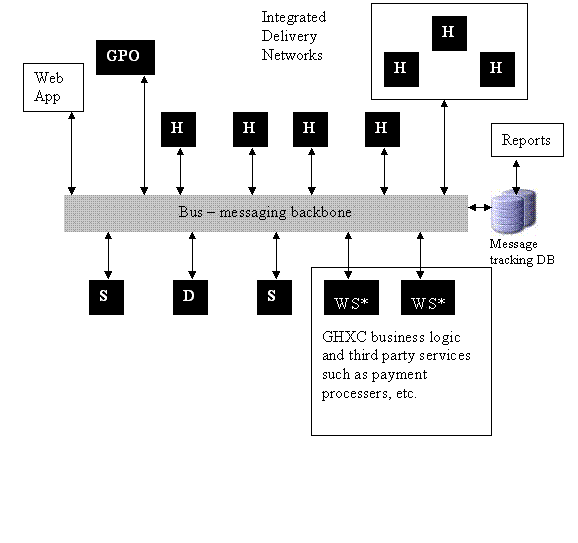GLOBAL HEALTHCARE EXCHANGE CANADA: TRADE EXCHANGE ADOPTION CASE
Memorandum
To: Norman Sung
Subject: GLOBAL HEALTHCARE EXCHANGE CANADA: TRADE EXCHANGE ADOPTION
Date: Jan 11, 2011
This memorandum is to provide suggestions how Global Healthcare Exchange Canada
(GHXC) can improve adoption rates and cost recovery for healthcare organizations.
Building critical mass
Since GHXC is meant to act as a single trading source for buyers and sellers in the healthcare industry, it is very important to involve a large amount of participants to use the system. When critical mass is built, other participants would be more willing to join GHXC.
Technology
One of the biggest obstacles that GHXC has to overcome is to simplify training and reduce both the time for switching to a new system and the investment cost of deployment. The easiest solution in this case would be to allow users to use existing enterprise resource planning (ERP) systems. Using a familiar interface would substantially reduce the learning period for participants.
Instead of the “Hub” method of Exchange Electronic Connection it is suggested that the Enterprise service bus (ESB) infrastructure [1] be used. This message exchange architecture would help connect to existing ERP systems using appropriate adapters converting and sending messages in an XML format. Connectivity to existing systems could be established in a centralized fashion by hospitals’ IT departments.
Based on Service Oriented Architecture (SOA), ESB infrastructure would provide flexibility, scalability, reliability and message tracking capability, so important for systems of this complexity.
Benefits to Dealers
ESB infrastructure is flexible enough to apply individual pricing strategy. Since all messages are going through a single database repository, built-in database reporting tools can be used for analysis of consumers’ purchasing behavior and monitoring real time demand trends.
Benefits to Consumers
The system would eliminate the use of faxes and follow-up calls to confirm orders. It would also have the ability to connect to many different suppliers and monitor stock inventories. The system would automatically allow the reordering of materials when stocks would fall below a designated threshold. It would promote standardization of the purchasing process and create transparency between departments.
Benefits to Government
Both Government institutions and hospitals would benefit from GHXC implementation because it would allow spending to be monitored. The system would create a more competitive environment among suppliers thus driving down the cost of materials. Potentially, the federal government could allocate some funds to promote GHXC implementation in hospitals.
- Enterprise Integration EAI vs. SOA vs. ESB. Anurag Goel. http://hosteddocs.ittoolbox.com/Enterprise%20Integration%20-%20SOA%20vs%20EAI%20vs%20ESB.pdf
Appendix 1
| Evaluation Parameter | Hub Architecture | Bus Architecture | |
| Proprietary busbased product suit | ESB | ||
| Installation Effort | Less installation effortcompared to solutionswith bus architecture | Moderate effort | Moderate effort |
| Administration | Easy to maintain and administrate because of central hub. | Administration may be complex depending upon the integrated systems | Administration may be complex depending upon the integrated systems |
| Cost | High | High | Low cost because it does not use proprietary formats to enhance performance.Also it does not provide all the services usually provided by proprietary product suits. |
| Scalability | High if federatedarchitecture is usedotherwise limited by
the hardware of box used to host Hub |
Highly scalable | Highly scalable |
| Standards | Mostly standard basedbut may useproprietary internal
formats |
Mostly standard basedbut may useproprietary internal
formats |
Standard based |
| SOA | Can be implementedas service oriented | Can be implementedas service oriented | Service oriented |
Source: http://hosteddocs.ittoolbox.com/Enterprise%20Integration%20-%20SOA%20vs%20EAI%20vs%20ESB.pdf
Appendix 2
Proposed ESB implementation
